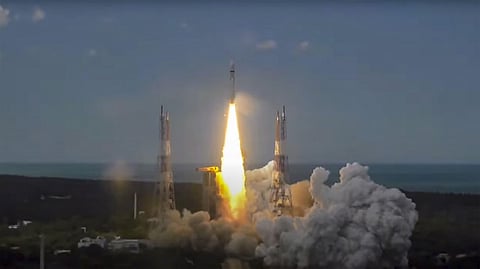

India's private space sector is on an upward trajectory. From one start-up company in 2012, there are now 196 start-ups in the space sector registered with the Department for Promotion of Industry and Internal Trade (DPIIT), Ministry of Commerce & Industry.
"As per the Economic Survey of India, in 2019, there was an investment of around USD six million in the space sector. This figure went up to over USD 110 million in 2022 which is the highest ever investment in start-ups till date," Dr Vinod Kumar, director, Indian National Space Promotion and Authorization Centre (IN-SPACe) told The New Indian Express.
He added that the policy on FDI in the space sector is going to be "released any time now, which will ease and encourage foreign investments in the domain", he added.
Presently, FDI in the satellite establishment and operations is allowed up to 100 percent through government route only subject to sectoral guidelines of the Department of Space (DoS).
IN-SPACe, inaugurated by Prime Minister Narendra Modi on June 10, 2022, is the regulatory and promotional body for space activities and has been involved in revision of the FDI policy with other significant stakeholders.
"The FDI issue has been one of the key challenges for the private space sector because many of the start-ups are unable to get investments, and the foreign companies which want to invest in the Indian space sector are also not able to do so due to the FDI policy," IN-SPACe Chairman Dr Pawan Goenka had earlier said in an international conference organised by the Astronautical Society of India (ASI) in collaboration with Indian Space Research Organisation (ISRO), IN-SPACe
and other stakeholders in Bengaluru in June this year.
"Besides the proposed FDI policy on space, a seed fund scheme conceived by IN-SPACe to provide initial financial assistance up to Rs 1 crore to Indian start-ups has already been implemented," said Kumar.
He added that opportunities for the agriculture sector under the seed fund scheme using space technology have received 62 applications and results will be announced soon.
Meanwhile, IN-SPACe will "shortly" have a pre-Expression of Interest (EoI) consultation with applicants, who have submitted an EoI for SSLV technology transfer to domestic industries. There are 20 applicants in the fray.
On July 11, Dr Pawan Goenka, chairman, IN-SPACe, while announcing the release of the EoI for SSLV Technology Transfer to Indian industries had outlined that "this, first of its kind Transfer of Technology (ToT) is a significant milestone for the Indian space sector. Unlike in the case of PSLV where a manufacturing contract was awarded to a consortium, in case of SSLV, the launch vehicle technology is being offered in its entirety to the private industry. This will pave the way for India to become the global hub for such launches."
Since its inception last year, IN-SPACe has received 300 applications from MSMEs, start-ups, academia and large established business houses. The nature of requests include authorisation, hand holding, facility support, consultancy and technology transfer.
The global space economy is estimated at USD 440 billion in 2022.
India ranks among the top five space-faring nations in the world in terms of technological capabilities, and is recognised for building low-cost satellites and launch vehicles. The Indian space sector accounts for only two to three percent of the global space economy.
The Indian Space Policy 2023, which was announced in April 2023 this year is likely to enhance the country's share to eight to 10 percent by 2033.